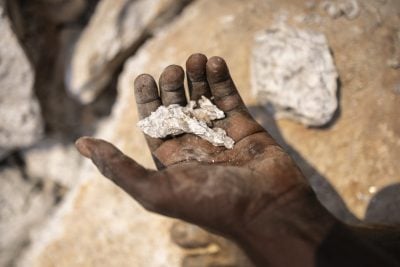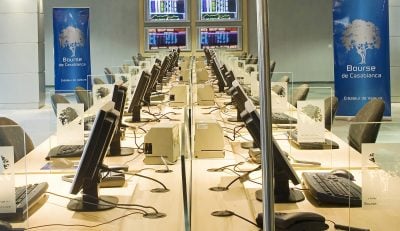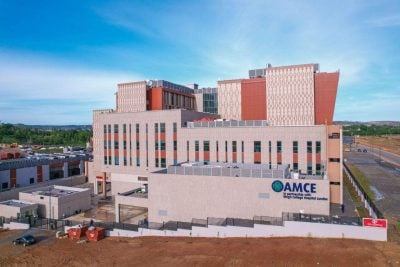Just after the World Economic Forum in Davos, Switzerland, political and business leaders in Africa also convened – in Aburi, outside Ghana’s capital Accra – to try to unlock the particular puzzle that is Africa’s inability to convert its vast resources into economic progress and prosperity. Convened by the Africa Prosperity Network (APN) in conjunction with the African Continental Free Trade Area (AfCFTA) secretariat, the Africa Prosperity Dialogues 2024 are an attempt to focus the minds of decision makers on the practical steps that can be taken to reverse the dire narratives around the continent and to procure a consensus on how Africa’s wealth of opportunities can be fully harnessed into growth.
According to Gabby Asare Otchere Darko, founder and executive chairman of APN, the organisation’s aim is to shift the narrative around Africa from one that focuses on poverty reduction to one that is oriented towards empowering nations to pursue prosperity by leveraging their natural resources, adding value and promoting robust intra-African trade. “We acknowledge the AfCFTA agreement holds the potential to make substantial contributions to sustainable economic growth, generation of employment opportunities, increased foreign direct investment, industrial development, and enhanced integration of the continent into the global economy and overall prosperity of all Africans,” he said, emphasising the partnership between the organisation and the AfCFTA secretariat.
The three-day event was held under the theme “Developing Prosperity in Africa: Produce, Add Value, and Trade,” and was attended by political leaders including presidents Sahle-Worķ Zewde of Ethiopia and Dr Mohamed Irfaan Ali of Guyana. Also present were the vice president of Cote d’Ivoire, Tiemoko Meyliet Koné; the deputy speaker of the parliament of Egypt, Mohamed Abou El-Enein and former president of Mozambique and chairman of the Africa Forum, Joaquim Alberto Chissano.
They were joined by business leaders from across the continent, among them Marufatu Abiola Bawuah (chief executive officer of UBA Africa); Alex Dadey (the chairman of KGL); Julius Mwale (the principal behind Mwale Medical and Technology City in Kenya); and Lacina Koné (chief executive of Smart Africa). Also present were Professor Benedict Okey Oramah, president of the Africa Export Import Bank; Serge Ekué, President of the West African Development Bank, Dr. Sidi Ould Tah, president of the Arab Bank for Economic Development in Africa; and Solomon Quaynor, vice president (private sector, infrastructure and industrialization) of the African Development Bank Group.
Natural and human resources
The broad consensus among speakers was that Africa’s current status is incongruent with the natural and human resources at its disposal. Welcoming guests to the conference, Ghana’s president Nana Akufo-Addo declared that “Africa is not a poor continent, in fact, she’s too rich to be poor; our continent has oil, gas, minerals and abundance of sunlight. We have some 65% of all arable land available to feed nine billion people globally by 2030.”
In the decades since independence, African countries have largely stuck to the colonial economic model, extracting or harvesting raw materials and importing finished goods made from them. According to Briggette Harrington, adding value to gold, coffee and cocoa can yield 10 times as much as countries earn from exporting them raw.
Former president Chissano encouraged governments and the African private sector to work together to add value to the continent’s resources, to “add value to feed our people and reduce hunger and ensure that every nation in Africa is food secure”.
Governments, in particular, were encouraged to craft enabling regulations and build the necessary infrastructure to support Africa’s industrialisation. Jean-Francois Le Bihan, head of government and industry relations for east, southern and western Africa at Ericsson, urged African governments to update their licensing and regulatory regimes to make them more conducive for private-sector investment. Selorm Adadevoh, CEO of MTN Ghana, noted that the removal of regulatory barriers had been shown to be effective in “more developed markets where these barriers had been taken down”.
With an infrastructure deficit estimated to be north of $1.3 trillion and ever-tightening budgets, African countries also need to be inventive. Kofi Adomakoh, managing director of Ghana’s GCB Bank Ltd, noted that there is a pronounced lack of long-term debt and equity options of the kind needed for such projects in Africa. “Public-private partnerships are good but the right investment and legal frameworks must first be in place,” he said. Kwamina Duker, CEO of the Development Bank of Ghana also talked up the benefits of PPPs, among them freeing up resources for other public investments.
Another lingering effect of the colonial period is that African countries trade much less with each other than with the outside world. At 17%, it has the lowest level of intra-continental trade. Wale Tinubu, CEO of Oando, called for the integration of roads, rail, and ports to facilitate smoother movement of goods across African nations. He highlighted the disparity between European Union passports and African passports within Africa, emphasising the need for more accessible and inclusive travel. Dealing with 44 different currencies costs, he said, $5bn annually: Tinubu advocated for simpler regulations and a common currency under the AfCFTA.
Speakers at the summit were united in the hope that AfCFTA would catalyse the continent’s efforts towards industrialisation, trade, job creation and prosperity. Wamkele Mene, head of the secretariat, said the agreement presents an opportunity to complete the decolonisation project that African countries embarked on in the 1950s.
One of the challenges Mene identified is the deficit in industrial capacity to process minerals. But three African countries are among the top five lithium producers: “we have an opportunity to place Africa at the centre of global industrialisation,” he said,
At the end of the summit, business and political leaders made a series of commitments in a “Peduase Compact” that Ghana’s president said he would present to the next Meeting of Heads of State and Government of the African Union (AU).
Business leaders pledged to foster collaboration with central banks, financial institutions, and key stakeholders to strengthen investments in technology, ensuring the interoperability and standardisation of payment systems across the continent. They promised to escalate investments in digitalisation.
In addition, they will embrace cutting-edge technologies for the improvement of agribusinesses. This includes the adoption of precision farming, drone technology, and Internet of Things-based solutions to enhance productivity, efficiency, and sustainability. Lastly, the compact enjoins Africa’s business leaders to prioritise investments in critical minerals crucial for various emerging technologies and ensuring environmentally sustainable mining practices.
Political pledges
Political leaders also pledged to harness the potential of public-private partnership arrangements in order to amplify investments in infrastructure development, particularly in the areas of transportation, logistics and digital infrastructure. The objective is to foster intra-African trade and to enhance connectivity for African nations, facilitating their access to global markets. Oil-rich African nations committed to promoting the establishment of integrated refineries by leveraging innovative financing mechanisms and encouraging private sector participation. They further agreed to deepen regional integration efforts, to leverage the AfCFTA to integrate into regional and global value chains, and to focus on increasing investments in agriculture to support smallholder farmers. Countries will make concerted efforts to promote climate-smart agriculture.
The APN sees financial interoperability as a low-hanging fruit for achieving a substantial part of the AfCFTA’s objectives. It is two pronged: roaming services, and – perhaps more importantly – cross-border payments (see pages 54-55). APN executive chairman Otchere Darko says that “Interoperability is not just a technical term; it is a catalyst for unity and economic integration. It promises an Africa where borders are no longer barriers to trade and prosperity. Imagine the transformative impact on trade if businesses could transact across borders as seamlessly as if they were within their own countries.”
Want to continue reading? Subscribe today.
You've read all your free articles for this month! Subscribe now to enjoy full access to our content.
Digital Monthly
£8.00 / month
Receive full unlimited access to our articles, opinions, podcasts and more.
Digital Yearly
£70.00 / year
Our best value offer - save £26 and gain access to all of our digital content for an entire year!


 Sign in with Google
Sign in with Google 





